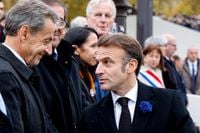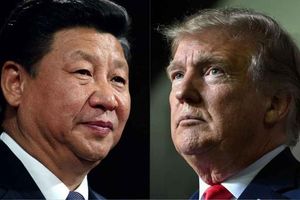French President Emmanuel Macron is navigating a complex political landscape as he considers the possibility of fresh elections in France, a move that could reshape the country's political future. This speculation comes at a time when political risks are resurfacing in Europe, echoing past uncertainties that have long affected the continent.
On April 25, 2025, Macron's contemplation of new elections signals a significant moment in French politics. The backdrop of this potential shift is the recent turmoil surrounding former president Nicolas Sarkozy, who was sentenced to prison for corruption. This situation complicates Macron's leadership as he balances domestic concerns with international obligations.
In a related development, Macron has decided against revoking Sarkozy's Legion of Honor, despite the latter's criminal conviction. Sarkozy, who served as president from 2007 to 2012, was handed a three-year prison sentence on December 18, 2024, for corruption and influence peddling. Emmanuel Macron, as the grand master of the Legion of Honor, stated that he would "not make any decision of this type" regarding Sarkozy's honors at this stage. This decision has been met with mixed reactions, especially given that the Legion of Honor code typically excludes individuals who have been convicted of crimes.
General François Lecointre, the grand chancellor of the Legion of Honor, remarked that the degradation of Sarkozy is "a matter of law," emphasizing the importance of integrity within the order. Despite the legal framework suggesting that Sarkozy should lose his honors due to his conviction, Macron's choice reflects a strategic hesitation to further polarize the political landscape.
Meanwhile, Macron's leadership is also being tested on the global stage. On the same day he considered the election scenario, he expressed solidarity with India following a tragic terrorist attack in Pahalgam, Jammu and Kashmir, which resulted in the deaths of 25 Indian nationals and one Nepali citizen. The attack, which occurred on April 22, 2025, has drawn widespread condemnation and highlighted the ongoing threat of terrorism.
In a phone call with Indian Prime Minister Narendra Modi, Macron conveyed France's support, stating that France stands firmly with India and its people during this time of grief. He emphasized that France would continue to fight against terrorism in collaboration with its allies. This commitment underscores France's role in international security and its dedication to combating global terrorism.
The Pahalgam attack has prompted India to take significant diplomatic measures, including halting the Indus Waters Treaty and closing the Integrated Check Post at Attari. These actions reflect India's strong resolve to respond to the attack and bring the perpetrators to justice. Modi thanked Macron for his message of support, reinforcing the importance of international cooperation in addressing terrorism.
As Macron weighs the implications of fresh elections, he must also contend with the fallout from Sarkozy's legal troubles and the international ramifications of the recent terrorist attack. These events are interconnected, illustrating the delicate balance Macron must maintain as he leads France through a period of uncertainty and potential change.
Political analysts suggest that the consideration of new elections could stem from a desire to secure a stronger mandate in light of increasing challenges. Macron's government has faced criticism over various issues, including economic policies and responses to public unrest. The prospect of elections might be seen as a way to reinvigorate support and address the growing discontent among the electorate.
Historically, France has experienced significant political upheaval, and the current climate suggests that Macron's administration could be at a crossroads. The potential for fresh elections may not only reshape the political landscape in France but also impact the broader European context, where political stability is increasingly in question.
In summary, as Emmanuel Macron navigates the complexities of his presidency, he faces the dual challenge of addressing domestic political risks while responding to pressing international concerns. The decisions made in the coming weeks could have lasting implications for France and its role within Europe and the world.




